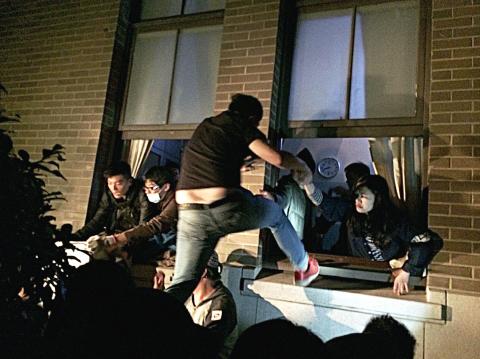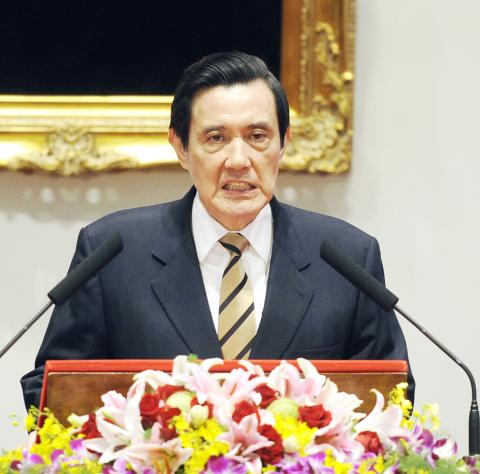Mounting frustration over what they see as the government’s lack of sincerity in addressing protesters’ demands over the cross-strait services trade pact led students to force their way through security barricades and razor wire into the Executive Yuan complex in Taipei last night to stage a sit-in.
At about 7:30pm, hundreds of students vaulted the barriers at the three main entrances of the Executive Yuan compound, clashing with police carrying shields and truncheons. As more students poured in, the police were outnumbered and in just half an hour, the complex was almost entirely occupied.
About one hour later, the students made it to the second floor of the Executive Yuan’s main building and, using a ladder, burst into Premier Jiang Yi-huah’s (江宜樺) office.

Photo: CNA
Several police officers and students were hurt in the ensuing melee as more police were deployed to contain the situation and ambulances called in to tend to the injured, which included some protesters who fainted and others injured by broken glass.
Meanwhile, more protesters gathered outside the building, shouting slogans such as: “Rejecting the cross-strait service trade agreement, defending democracy.”
They said they decided to occupy the Executive Yuan because President Ma Ying-jeou (馬英九) had apparently failed to understand the concerns they have repeatedly expressed over the past days.

Photo: George Tsorng, Taipei Times
At a press conference yesterday morning, Ma showed that he was completely ignoring the public’s voices, the activists said.
“We are here to tell Ma that he should listen to the public’s angry shouts and listen to their voices,” the students said, adding: “We will demonstrate citizens’ strength again and again.”
“Tonight we are in the Executive Yuan. Tomorrow we will go to other government agencies to voice our concerns,” they shouted.
Taiwanese should not be afraid of the government, the government should be afraid of them, the protesters added.
Protest leader Chen Wei-ting (陳為廷), a National Tsing Hua University student, said last night that the move to break into the Executive Yuan was not initiated by members of the Black Island Nation Youth Front — the group behind the Legislative Yuan occupation.
However, he said he fully respected civic groups’ decision to occupy the Executive Yuan compound, while fellow protest leader Lin Fei-fan (林飛帆), a National Taiwan University student and another key figure in the legislative occupation, stressed the principles of peace and non-violence.
At 11pm, Premier Jiang Yi-huah (江宜樺) ordered the National Police Agency to deploy more officers to the Executive Yuan to forcibly remove the protestors.
Executive Yuan spokesperson Sun Lih-chyun (孫立群) said that Jiang was distressed by the protesters’ moves, and had vowed to hold them responsible for what he called their illegal and violent actions.
According to the Executive Yuan, protestors burst into some offices on the second floor of the main building and damaged them.
Protesters also gained entry to Jiang’s office, but were soon forced out by police, the Executive Yuan said.
No damage to Jiang’s office has been reported.
Presidential Office spokesperson Lee Chia-fei (李佳霏) said that Ma discussed the situation with Jiang by telephone last night, and supported the premier’s decision to evict the protestors.
Security has been beefed up around the Presidential Office Building and the president’s residence, the Presidential Office said.
Earlier in the day, students and other activists occupying the legislative floor lashed out at Ma over his refusal to withdraw the service pact and push for legislation to monitor cross-strait agreements, vowing to continue their occupation of the Legislative Yuan and call for a nationwide strike.
“Regrettably, the president did not agree to hold a dialogue with us, as we wanted. Instead, he repeatedly iterated his propaganda, while ignoring the public’s voice and failing to come up with a concrete response to the expectations of Taiwanese and of the students,” Lin told a press conference at the legislative chamber held after Ma’s press conference.
“We are occupying the legislature because of the government’s unlawful actions [regarding the pact] and we hereby call on Ma not to twist the facts and reverse the cause and effect so he can blame the public for the situation,” Lin added.
Lin was referring to the announcement by Chinese Nationalist Party (KMT) Legislator Chang Ching-chung (張慶忠) on Monday last week that the trade agreement would skip the legislative committee phase of the review and be referred directly to the general assembly.
Lin said what Chang did was undemocratic, adding that “the government is setting the worst possible example for the public.”
He went on to say that the protesters would continue to demand that the government withdraw the trade pact and draft laws to oversee cross-strait agreements, before issuing a new demand that the government hold a nationwide conference to resolve the deadlock.
“Our occupation of the legislative chamber is meant to show how ridiculous the system is and to remind the government that, the citizens of a democratic country should take part in said country’s policymaking so they can help decide their nation’s future,” Lin said. “Taiwan must be a country for all Taiwanese.”
This story has been updated since it was first published.

SECURITY: As China is ‘reshaping’ Hong Kong’s population, Taiwan must raise the eligibility threshold for applications from Hong Kongers, Chiu Chui-cheng said When Hong Kong and Macau citizens apply for residency in Taiwan, it would be under a new category that includes a “national security observation period,” Mainland Affairs Council (MAC) Minister Chiu Chui-cheng (邱垂正) said yesterday. President William Lai (賴清德) on March 13 announced 17 strategies to counter China’s aggression toward Taiwan, including incorporating national security considerations into the review process for residency applications from Hong Kong and Macau citizens. The situation in Hong Kong is constantly changing, Chiu said to media yesterday on the sidelines of the Taipei Technology Run hosted by the Taipei Neihu Technology Park Development Association. With

CARROT AND STICK: While unrelenting in its military threats, China attracted nearly 40,000 Taiwanese to over 400 business events last year Nearly 40,000 Taiwanese last year joined industry events in China, such as conferences and trade fairs, supported by the Chinese government, a study showed yesterday, as Beijing ramps up a charm offensive toward Taipei alongside military pressure. China has long taken a carrot-and-stick approach to Taiwan, threatening it with the prospect of military action while reaching out to those it believes are amenable to Beijing’s point of view. Taiwanese security officials are wary of what they see as Beijing’s influence campaigns to sway public opinion after Taipei and Beijing gradually resumed travel links halted by the COVID-19 pandemic, but the scale of

A US Marine Corps regiment equipped with Naval Strike Missiles (NSM) is set to participate in the upcoming Balikatan 25 exercise in the Luzon Strait, marking the system’s first-ever deployment in the Philippines. US and Philippine officials have separately confirmed that the Navy Marine Expeditionary Ship Interdiction System (NMESIS) — the mobile launch platform for the Naval Strike Missile — would take part in the joint exercise. The missiles are being deployed to “a strategic first island chain chokepoint” in the waters between Taiwan proper and the Philippines, US-based Naval News reported. “The Luzon Strait and Bashi Channel represent a critical access

Pope Francis is be laid to rest on Saturday after lying in state for three days in St Peter’s Basilica, where the faithful are expected to flock to pay their respects to history’s first Latin American pontiff. The cardinals met yesterday in the Vatican’s synod hall to chart the next steps before a conclave begins to choose Francis’ successor, as condolences poured in from around the world. According to current norms, the conclave must begin between May 5 and 10. The cardinals set the funeral for Saturday at 10am in St Peter’s Square, to be celebrated by the dean of the College